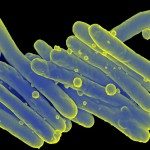Lien vers Pubmed [PMID] – 19047741
Microbiology (Reading, Engl.) 2008 Dec;154(Pt 12):3731-42
Previous work on the population structure of Mycobacterium bovis strains in Great Britain has identified highly successful clones which are expanding across the country. One such clone, designated M. bovis type 17, differs from all other members of the Mycobacterium tuberculosis complex in having a region of deletion, termed RDbovis(d)_0173, of seven genes between Mb1963c and Mb1971. Three of these genes have functions annotated in lipid metabolism. To explore the molecular basis for the success of this clone, we examined the impact of this deletion on lipid metabolism. While type 17 isolates had similar lipid composition to other M. bovis strains, their ability to incorporate propanoate into mycolic acids was remarkably low. When expressed as a reciprocal (the ratio of incorporation of label from acetate : propanoate into mycolic acids) the ratio was higher for all three type 17 field strains tested (mean: 18.90) than the values of 7.30 to 7.61 for other field strains (P < 0.002) and values < 6.50 for all other strains in the M. tuberculosis complex tested. The label from propanoate was diverted to pyruvate, at significantly higher levels in M. bovis type 17 than all other strains (P < 0.021). Complementation of M. bovis type 17 with an integrating cosmid, IE471, carrying the M. tuberculosis orthologues of Mb1963c-Mb1971 resulted in the ability of the recombinant strain to incorporate label from propanoate into mycolic acids in a manner similar to other strains. M. bovis type 17 : : IE471 labelled pyruvate from propanoate about four times more slowly than the parent strain. Thus, RDbovis(d)_0173 results in a profound effect on carbon metabolism, providing the ability to compensate for the inactivation of the ald and pykA genes, involved in pyruvate metabolism, that is seen in M. bovis (but not in M. tuberculosis). This shift in carbon metabolism may be a factor in the extraordinary clonal expansion reported for M. bovis type 17.

